Kia Tuning
Kia Ceed GT Tuning Parts: The Best Upgrades for Maximizing Performance
Next-level performance for your Kia Ceed GT awaits—discover the essential tuning parts that can transform your ride into a true powerhouse.
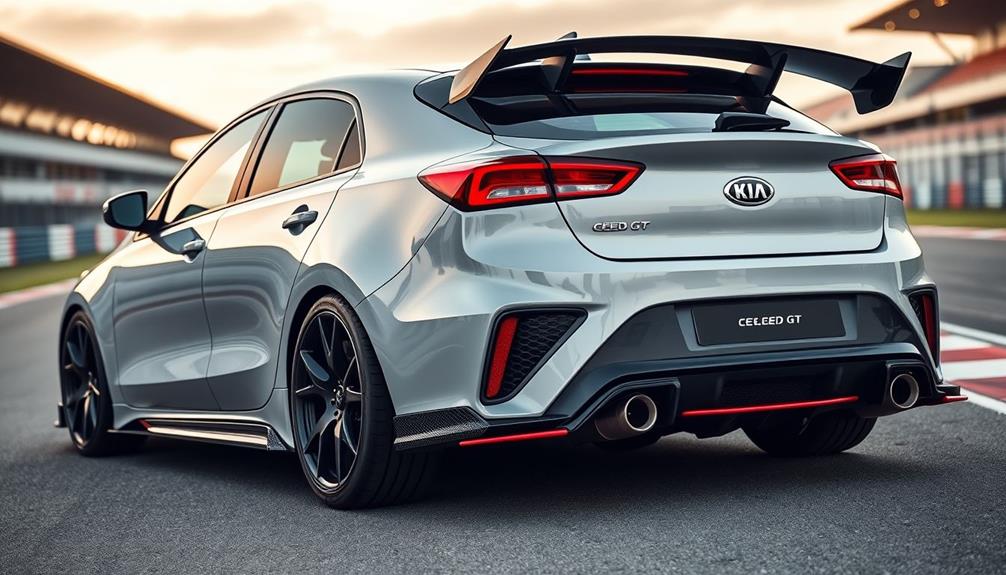
To maximize your Kia Ceed GT's performance, start with basic upgrades like an ECU remap and a performance air intake. These can boost power by up to 20%. Consider adding a turbocharger for an impressive increase of 30-50%. For better handling, invest in coilover suspension and upgraded brake systems, which enhance cornering stability and stopping power. Don't forget aftermarket exhaust systems to improve airflow and sound. Remember to document all modifications to protect your warranty and insurance. If you're enthusiastic for more detailed tips on each upgrade, you're in the right place!
Key Takeaways
- ECU Remapping can significantly boost power output by up to 20%, enhancing overall performance without extensive engine modifications.
- Turbocharger Upgrades can potentially increase horsepower by 30-50%, offering a substantial performance enhancement for the Kia Ceed GT.
- Coilover Suspension improves handling and cornering stability by allowing ride height adjustments, reducing body roll during aggressive driving.
- Aftermarket Exhaust Systems enhance exhaust flow and provide a sportier sound, typically costing between $500 to $1,200 for improved performance.
- High-Performance Brake Kits enhance braking efficiency with larger calipers and rotors, crucial for maintaining safety alongside performance upgrades.
Tuning Modification Stages
When diving into tuning your Kia Ceed GT, understanding the modification stages is essential for achieving peak performance.
Tuning modifications are generally categorized into three main stages.
Stage 1 includes basic upgrades like panel air filters and remaps, which can boost your power by about 10-20%. This stage offers a cost-effective way to enhance performance without delving into extensive engine work.
Once you're comfortable with Stage 1, you can move on to Stage 2.
This stage involves more extensive engine upgrades, such as power clutches and cam upgrades. Properly executed, these modifications can yield an additional 20-30% power increase, maximizing the potential of your earlier upgrades.
Engine Performance Enhancements
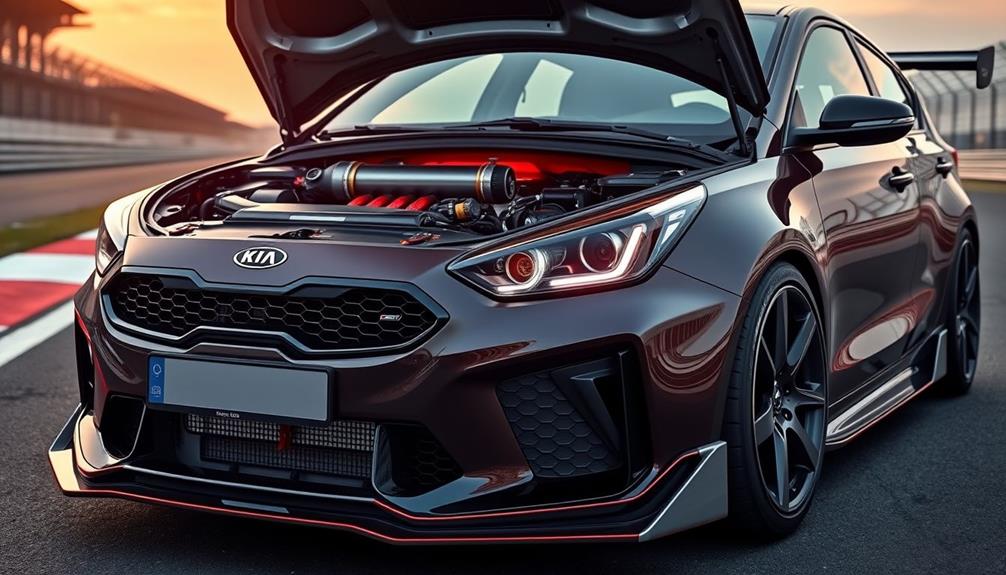
To enhance the engine performance of your Kia Ceed GT, consider a combination of upgrades that can greatly elevate your driving experience.
One of the most effective methods is ECU remapping, which can boost your power output by up to 20%, resulting in quicker throttle response and overall improved performance.
If you're looking for even more power, upgrading to a turbocharger can increase horsepower by an impressive 30-50%, considerably enhancing acceleration.
Additionally, installing a performance air intake system is a smart move. It improves airflow into the engine, leading to modest power gains and better fuel efficiency.
For those who appreciate a sportier sound along with performance, aftermarket exhaust systems are worth considering. They enhance exhaust flow and typically range in price from $500 to $1,200.
Suspension and Handling Upgrades

Upgrading your Kia Ceed GT's suspension and handling is essential for maximizing performance and driving enjoyment. One of the best ways to achieve this is by installing coilover suspension. This allows you to adjust the ride height, which can lower your vehicle by 30-35mm, greatly improving cornering stability and reducing body roll.
A lower center of gravity enhances traction, making your driving experience more exhilarating.
Additionally, consider adding strut braces to increase chassis rigidity. This upgrade helps maintain alignment during sharp turns, resulting in improved steering response and a more connected feel on the road.
Don't overlook the importance of brake upgrades either. High-performance options, like vented discs and ceramic pads, boost stopping power and reduce brake fade, ensuring safety during spirited driving.
If you're serious about performance, a big brake kit may be worth the investment. While it involves higher costs and a more complex installation, the considerable improvements in braking efficiency can be a game changer.
Exhaust and Induction Improvements
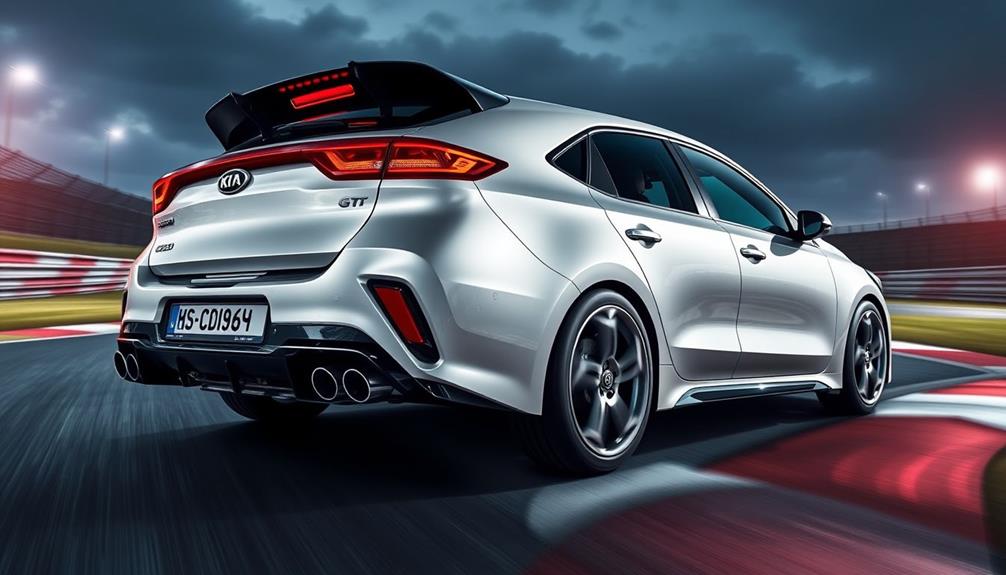
For those looking to elevate their Kia Ceed GT's performance, exhaust and induction improvements are vital upgrades. Upgrading to an aftermarket exhaust system can greatly boost horsepower by enhancing airflow.
You'll typically find costs ranging from $500 to $1,200 for these systems. However, it's important to choose the right size; an exhaust that's too large can actually lead to power loss.
In addition to exhaust upgrades, consider installing a performance induction kit. These kits are especially beneficial for turbo engines, as they improve airflow and overall engine efficiency compared to stock filters.
To maximize your gains, combine these enhancements with ECU remapping. This can yield power increases of up to 20%, making your vehicle more responsive and enjoyable to drive.
For even better results, using high-octane fuel (≥98) alongside these performance upgrades can help you tap into the full potential of your Kia Ceed GT, enhancing both horsepower and torque.
Brake System Upgrades

Braking performance is essential for any performance vehicle, and enhancing your Kia Ceed GT's brake system can greatly improve your driving experience.
Start with upgrading to high-performance or ceramic brake pads, which will boost durability and reduce brake fade, ensuring you maintain stopping power during intense driving conditions.
Consider vented brake discs as an important addition; they help dissipate heat generated during braking, preventing diminished performance.
If you're serious about performance, investing in big brake kits can make a significant difference. These kits offer larger calipers and rotors, enhancing braking force and reducing stopping distances, although they can be a bit pricey.
Don't overlook brake fluid—upgrading to a higher boiling point variant is essential. This prevents boiling under extreme conditions, ensuring consistent braking performance when you need it most.
For even better cooling efficiency, think about installing brake ducts. They're particularly beneficial during prolonged or aggressive driving, helping maintain ideal performance.
Community Resources and Insights
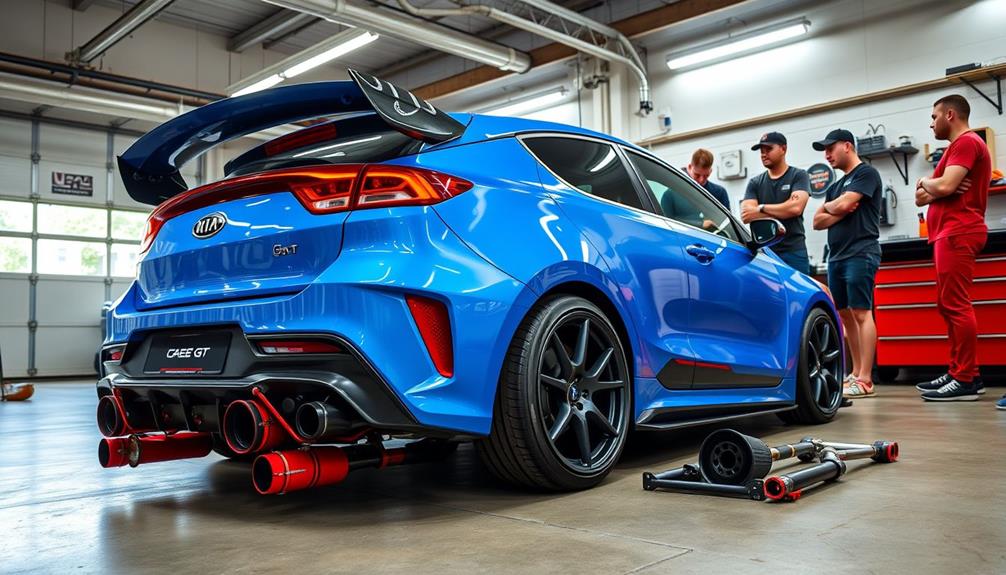
The Kia Ceed GT community offers a vibrant hub for enthusiasts keen to share their tuning journeys and insights.
With over 512.5K posts, this forum is a treasure trove of shared experiences focused on performance tuning and modifications. You'll find practical tips tailored to specific engines, like the 1.6 CRDI D4FB, which can greatly enhance your knowledge and improve your vehicle's capabilities.
The modified car gallery within the community is especially inspiring. It showcases successful upgrades from fellow members, giving you a visual reference for your tuning projects.
Extensive guides for different Kia models guarantee you won't lack relevant information when starting on your modifications.
Warranty Considerations for Modifications
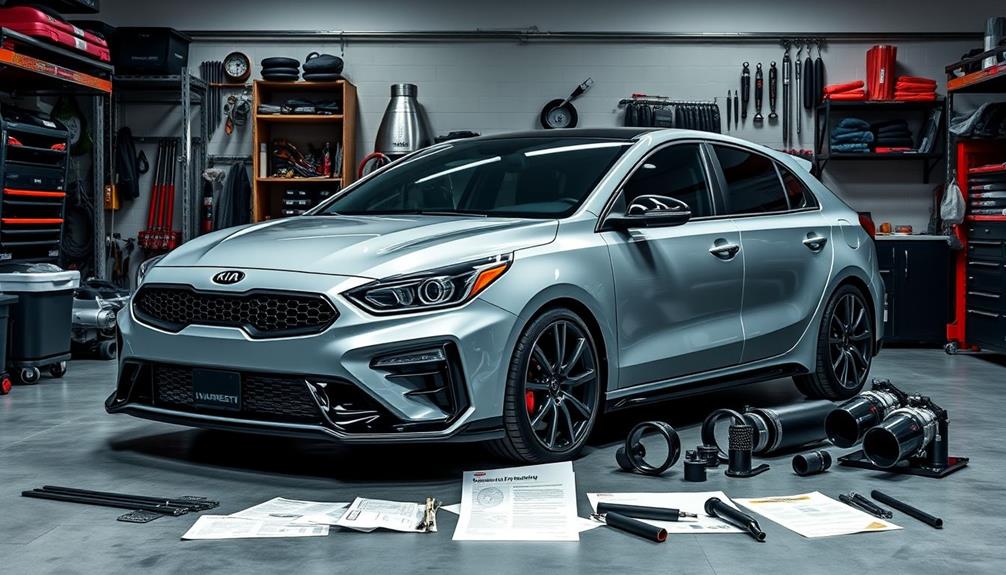
When you modify your Kia Ceed GT, it's vital to take into account how those changes might affect your warranty.
If you're not careful, certain upgrades can void your 7-year coverage, particularly if they involve major components.
Plus, keeping detailed documentation of your modifications is essential for both warranty claims and insurance purposes.
Warranty Impact Analysis
Modifying your Kia Ceed GT can enhance performance and aesthetics, but it's important to contemplate how these changes might impact your warranty. Many modifications can potentially void your manufacturer's 7-year warranty, making it vital to weigh the benefits of upgrades against warranty protections.
Each modification can have different warranty implications, so you should carefully consult the warranty terms for specific parts and upgrades. If you're considering professional tuning or aftermarket parts, be aware that these changes might lead to complications if you need to make a warranty claim.
It's wise to document all modifications for insurance purposes, as this documentation may be necessary for claims related to aftermarket parts. Engaging with the automotive community or seeking professional advice can provide clarity regarding potential risks tied to your warranty.
Before diving into modifications, take the time to understand how each upgrade could impact your warranty. Balancing performance enhancements with warranty protections is important for getting the most out of your Kia Ceed GT while minimizing future risks.
Always stay informed and make choices that align with your long-term vehicle goals.
Insurance Policy Effects
How can you protect your insurance coverage while enhancing your Kia Ceed GT? When you consider modifications, it's essential to understand how performance upgrades might affect your insurance policies.
Some insurers require you to disclose any modifications, like ECU remapping or turbocharger installations, to maintain your coverage. Failing to do so could lead to complications during a claim.
Additionally, keep in mind that certain upgrades can result in increased insurance premiums due to the perceived higher risk associated with modified vehicles. Insurers often view performance upgrades as a factor that raises the likelihood of accidents or theft, so be prepared for possible changes in your rates.
It's important to weigh the benefits of your desired modifications against their implications on your warranty and insurance. You might find that some enhancements could void your manufacturer's warranty, leaving you responsible for costs that would typically be covered.
Always document all modifications thoroughly, as this documentation is essential for insurance purposes and can be significant if you ever need to file a claim. By staying informed and proactive, you can enjoy your performance upgrades while safeguarding your insurance coverage.
Modification Documentation Importance
Documenting your modifications is essential for preserving your Kia Ceed GT's warranty and ensuring smooth insurance claims. When you make any changes, especially performance upgrades, you risk voiding the manufacturer's 7-year warranty if these modifications aren't properly documented.
Keeping thorough records is vital; this includes receipts for parts purchased, installation documents, and any professional tuning services you've utilized.
If you ever need to file a warranty or insurance claim, having this documentation can support your case and protect you against potential disputes. Additionally, some upgrades may necessitate further modifications to accommodate the increased power, and these should also be recorded to stay compliant with warranty requirements.
Before diving into modifications, it's wise to review your warranty terms and consult your dealership. Understanding how specific upgrades might affect your coverage can prevent unexpected issues down the road.
Performance Expectations and Realities

Achieving the full power potential of the Kia Ceed GT in real-world conditions often demands careful tuning and component upgrades.
While you might expect significant performance boosts from upgrades like exhaust systems and induction kits, these often yield only modest gains of about 10-20%.
The key to revealing more horsepower lies in extensive tuning methods, such as ECU remapping, which can push your engine to an impressive 250bhp with the right modifications.
However, it's essential to remember that real-world power gains can vary greatly.
Factors like fuel quality and your driving style play significant roles in how effectively your upgrades translate into performance.
You need to balance these enhancements with improvements to your suspension and braking systems to maintain driving stability and safety.
After all, pushing for maximum performance without considering these aspects can lead to an unbalanced vehicle.
Frequently Asked Questions
Can You Tune a Kia Ceed?
Yes, you can tune a Kia Ceed to enhance its performance. Options like ECU remapping and upgraded exhaust systems can boost power considerably. Just be aware of potential warranty and insurance impacts before proceeding with modifications.
How Much Brake Horsepower Does a Kia Ceed GT Have?
Picture yourself gripping the wheel of a Kia Ceed GT, feeling its power surge. With around 204 brake horsepower, it rockets from 0-60 mph in just 6.4 seconds, offering an exhilarating driving experience you won't forget.
Conclusion
In the world of Kia Ceed GT tuning, the road ahead is filled with exciting possibilities. By carefully selecting your upgrades, you can transform your ride into a true performance machine, gliding through curves and roaring down straightaways. Just remember, every enhancement whispers its own story, so choose wisely and embrace the journey. With a blend of passion and precision, you'll release the full potential of your Ceed GT and enjoy every thrilling moment behind the wheel.
Ethan is at the forefront of hybrid vehicle technology, making him an invaluable resource for our readers interested in hybrid tuning. His expertise in electric motor upgrades, battery systems, and regenerative braking allows him to provide cutting-edge advice on optimizing hybrid vehicles for performance and efficiency. Ethan’s work ensures that our content stays ahead of the curve in the rapidly evolving world of hybrid technology.
Kia Tuning
Kia Rio Tuning 2010: Transforming Your Compact Car Into a Performance Beast
Make your 2010 Kia Rio a performance beast with simple upgrades that unlock hidden power; discover the secrets to transforming your ride today.
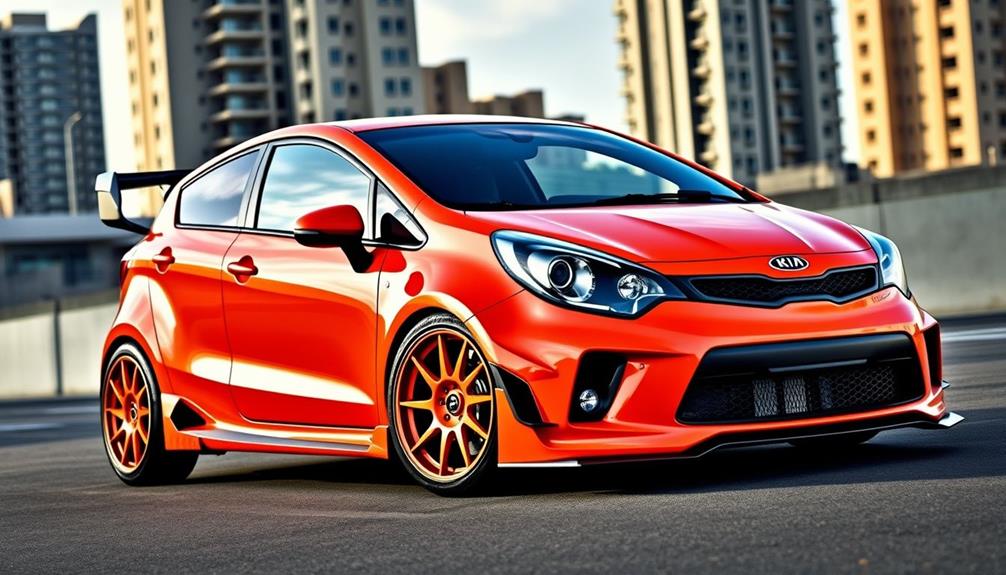
Tuning your 2010 Kia Rio can turn it into an exciting performance vehicle. Start with a cold air intake and a less restrictive exhaust system to boost airflow and enhance throttle response. An ECU tune can gain you up to 15% more horsepower and torque, while lightweight wheels improve acceleration and handling. If you're feeling adventurous, consider swapping in a 2.0L motor for a major power boost. Brake upgrades are essential to manage all that added power effectively. There's a wealth of community insights waiting to help you maximize your ride's potential and keep it practical.
Key Takeaways
- Upgrade the cold air intake and exhaust system for improved airflow and a boost of over 10 horsepower.
- Consider an ECU tune to enhance engine performance, yielding up to 15% more horsepower and torque.
- Explore engine swaps, like the 2.0L from Hyundai Tiburon, for significant power gains and responsiveness.
- Invest in brake upgrades and lightweight wheels to enhance handling and acceleration without compromising practicality.
- Engage with online tuning communities for tips and cost-effective modifications to maximize performance efficiently.
Performance Modifications Overview
When it comes to tuning your 2010 Kia Rio, performance modifications can make a significant difference in how your car drives. One of the most effective upgrades is a cold air intake, which can enhance airflow and yield an increase of 10+ horsepower.
Pair this with a less restrictive exhaust system, and you'll notice even better throttle response. For a more substantial boost, consider ECU tuning; optimizing your engine can improve horsepower and torque by up to 15%, enhancing your overall driving experience.
Don't overlook brake upgrades, either. As you increase power with these modifications, it's essential to confirm your braking system can handle the added performance.
Lightweight wheels can also contribute to better acceleration and handling by reducing rotational mass.
While upgrading to a turbocharger might tempt you, remember that the stock engine can only handle about 5-6 pounds of boost effectively.
Combining intake, exhaust, and tuning modifications will certainly lead to noticeable improvements in your car's performance, allowing you to enjoy a more exhilarating ride in your Kia Rio.
Engine Swaps and Upgrades
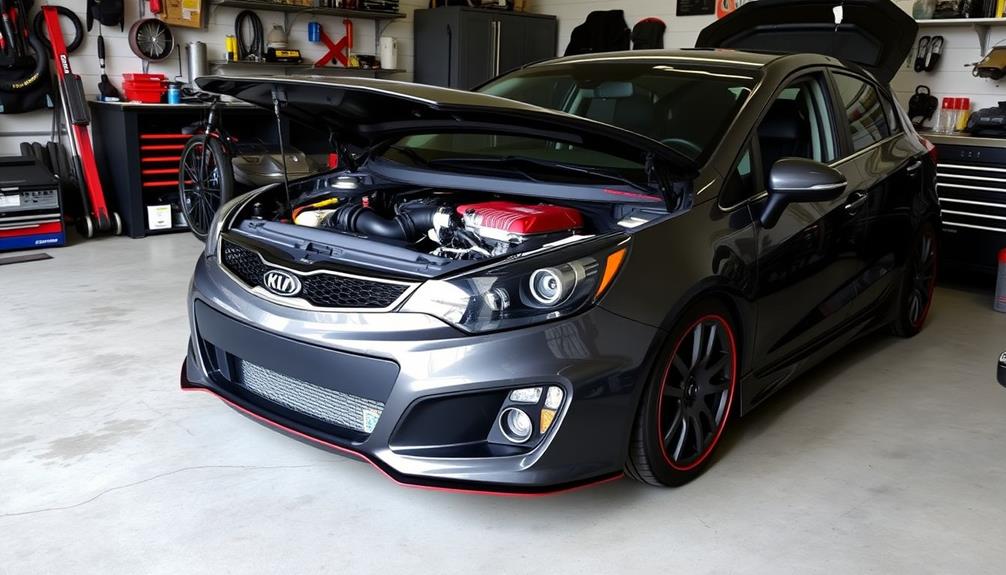
Upgrading your 2010 Kia Rio can go beyond simple bolt-ons; engine swaps provide a thrilling opportunity to greatly enhance performance. One popular choice is swapping in a 2.0L motor from the Hyundai Tiburon. This engine can considerably boost your engine performance compared to the stock setup. If you're looking for even more power, consider a V6 engine swap, though it's more complex and costly.
Here's a quick comparison of some engine upgrade options:
| Engine Swap Option | Potential Gains |
|---|---|
| Hyundai Tiburon 2.0L | Better acceleration, improved power |
| V6 Engine | Substantial power gains, enhanced dynamics |
| Turbocharger Upgrade | Increased capabilities (limited to 5-6 lbs boost) |
To truly maximize your engine's potential, don't forget the importance of aftermarket performance chips and ECU tuning. These upgrades optimize fuel maps and ignition timing, leading to better acceleration and efficiency. By investing in these engine swaps and upgrades, you can transform your Kia Rio into a performance beast that's both exhilarating and responsive.
Balancing Performance and Practicality
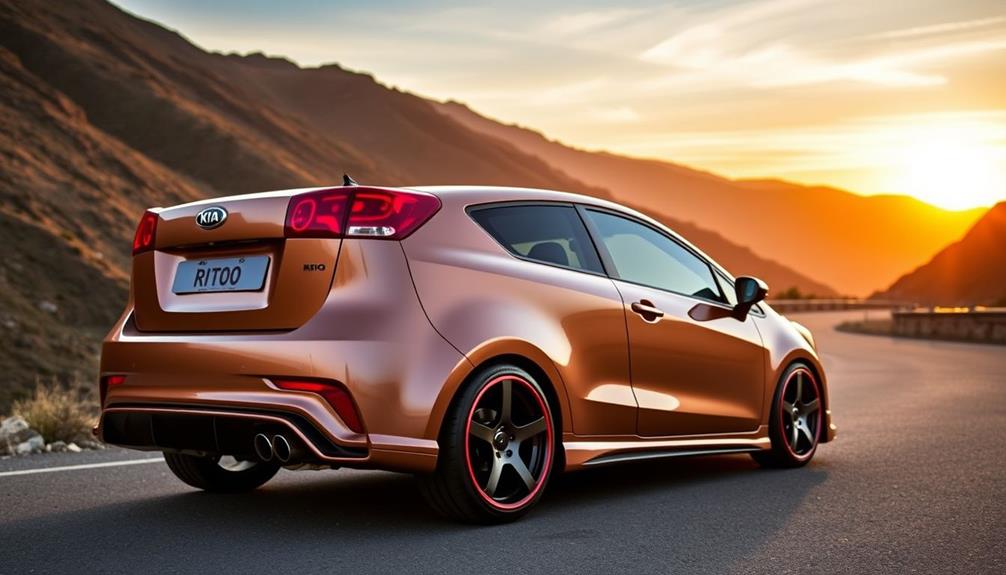
How can you achieve a thrilling driving experience without sacrificing daily practicality in your 2010 Kia Rio? Start by focusing on simple upgrades that enhance power while keeping your KIA Rio LX comfortable for everyday use.
Installing a cold air intake and a less restrictive exhaust can yield a modest boost of 10+ horsepower, allowing you to go fast without greatly impacting fuel economy.
While turbocharging sounds tempting, be cautious. You're limited to 5-6 pounds of boost on the stock engine, which can compromise durability if not done right. Instead, consider performance throttle bodies and fuel injectors to improve throttle response, but remember, these need proper tuning to be effective.
Upgrading your sway bars and brake pads is just as important. These enhancements improve handling and stopping power, maintaining balance as you increase horsepower.
Finally, investing in lightweight wheels can further elevate your KIA's performance without spending a ton. This way, you maintain a practical ride while enjoying the thrill of driving a modified compact car.
Community Insights on Tuning
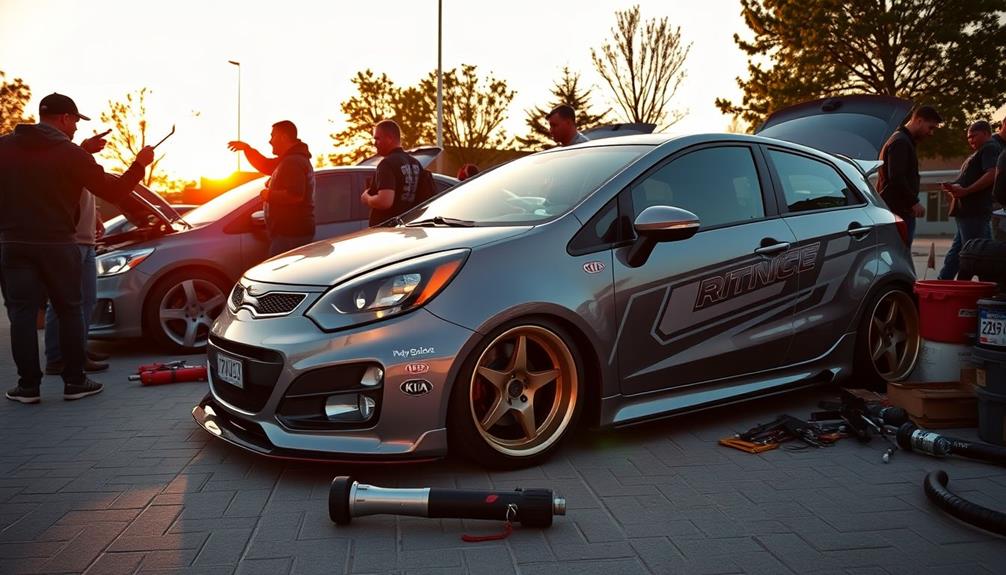
Kia enthusiasts have a wealth of knowledge to share about tuning the 2010 Kia Rio, making online forums an invaluable resource for anyone looking to enhance their ride.
With over 217,000 members, these communities discuss various tuning options, including performance chips and ECU tuning. Many users report horsepower increases of up to 15% while also optimizing fuel efficiency, which is vital for daily driving.
It's essential to balance performance upgrades with drivability, and community insights often highlight personal experiences with modifications.
You'll find discussions on how certain tweaks can impact everyday use, ensuring that your Kia Rio remains practical while delivering enhanced performance.
Cosmetic modifications are another popular topic, with enthusiasts often sharing ideas on upgraded wheels and exterior enhancements.
These visual upgrades can complement performance improvements, marrying style with substance.
Engaging with fellow Kia Rio fans can lead to valuable tips and recommendations for specific modifications.
This collaborative environment helps you achieve your desired performance goals efficiently and cost-effectively.
Market Trends and Model Insights
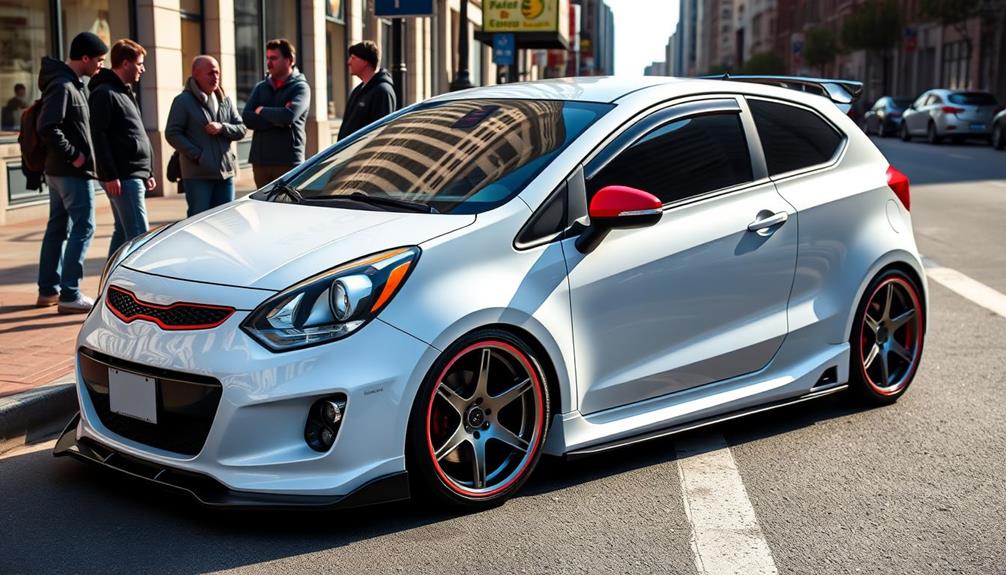
Affordability remains a key attraction for the 2010 Kia Rio, drawing in budget-conscious drivers who prioritize reliability and fuel efficiency. With used listings averaging around $2,600, the market demand for the Kia Rio stays steady, making it an appealing choice for those looking for cost-effective transportation.
While the Rio isn't designed for high performance, owners often turn to performance upgrades like cold air intakes and less restrictive exhaust systems to achieve modest performance gains. Some enthusiasts report improvements of over 10 horsepower with these modifications.
However, significant performance upgrades are limited by the car's stock capabilities, which leads many to engage in community discussions about the practicality of tuning the 2010 Rio. Although minor modifications can enhance your driving experience, drastic performance transformations are challenging due to the vehicle's design and mechanical layout.
This has prompted some enthusiasts to contemplate engine swaps or even trading their Rios for more performance-oriented vehicles. Ultimately, while the Kia Rio offers a solid foundation for budget-conscious consumers, those seeking serious performance may find their options limited.
Frequently Asked Questions
Can You Modify a Kia Rio?
Yes, you can definitely modify a Kia Rio. Upgrading components like the exhaust system, suspension, and engine tuning can enhance both performance and handling, making your driving experience more enjoyable and personalized to your preferences.
Can You Remap a Kia Rio?
Yes, you can remap a Kia Rio. By adjusting the ECU, you'll enhance performance and fuel efficiency. Just make sure to use the right software or consult a professional for the best results.
How Fast Can a Kia Rio Go?
The 2010 Kia Rio can reach a top speed of around 115 mph. With some modifications, like a cold air intake or turbocharger, you could potentially push it even faster for a more thrilling drive.
How Many Miles Can a Kia Rio Go on a Full Tank?
You can expect your 2010 Kia Rio to travel about 320 to 430 miles on a full tank, depending on whether you're driving in the city or on the highway. Regular maintenance helps maximize this range.
Conclusion
Tuning your 2010 Kia Rio isn't just for speed demons; it's about enhancing your driving experience while keeping practicality in mind. You might think it's not worth the investment, but the right modifications can greatly improve fuel efficiency and handling, making daily commutes more enjoyable. Plus, with a supportive community and growing market trends, you'll find plenty of resources to guide you. So, don't hesitate—transform your compact car into a performance beast and enjoy every ride!
Ethan is at the forefront of hybrid vehicle technology, making him an invaluable resource for our readers interested in hybrid tuning. His expertise in electric motor upgrades, battery systems, and regenerative braking allows him to provide cutting-edge advice on optimizing hybrid vehicles for performance and efficiency. Ethan’s work ensures that our content stays ahead of the curve in the rapidly evolving world of hybrid technology.
Kia Tuning
Kia Rio R Hatchback Tuning: Enhancing the Performance of Your Compact Car
Discover essential tuning tips for your Kia Rio R Hatchback that can significantly enhance performance and unleash hidden power—find out how to get started!
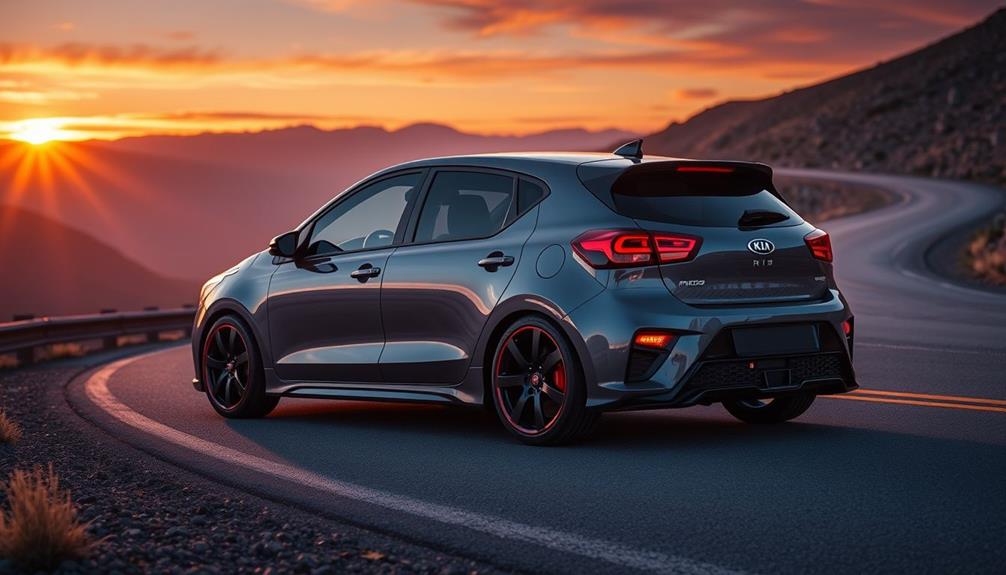
Tuning your Kia Rio R Hatchback can greatly boost its performance. Start with performance chips to optimize your engine's efficiency and power—options like Stage 1 and Stage 4 offer impressive gains in horsepower and fuel economy. Consider upgrading your air intake system for improved airflow and better acceleration. Voltage performance modules enhance power stability, while suspension and brake upgrades improve handling and safety. If you're feeling adventurous, adding forced induction like a turbocharger can provide an exhilarating power increase. There's a lot more to explore to access your car's full potential, so keep going to discover additional tuning tips!
Key Takeaways
- Upgrade performance chips for improved horsepower, torque, and fuel efficiency with easy plug-and-play installation options.
- Enhance airflow and acceleration by installing aftermarket cold air intake systems, boosting horsepower significantly.
- Improve handling and ride quality with performance suspension upgrades, including shocks and springs for lower ride height.
- Boost braking performance with upgraded pads, larger rotors, and stainless-steel braided lines for enhanced safety.
- Consider forced induction options like turbochargers or superchargers for substantial power gains, requiring professional tuning for optimal performance.
Performance Chips and ECU Tuning
Have you ever wondered how to unseal your Kia Rio R Hatchback's hidden potential?
Performance chips and ECU tuning are the keys to enhancing your driving experience. By using performance chips, like the Stage 1 for $99.99 or the Stage 4 for $299.95, you can unleash extra horsepower, torque, and even improve fuel economy by up to 15%.
These chips optimize air-to-fuel ratios, making your engine more efficient.
ECU tuning takes this a step further, providing a safe method to enhance throttle response and potentially saving you up to 4 miles per gallon.
The best part? Installation is a breeze with plug-n-play design, so you won't need to worry about cutting wires or complex modifications.
With advanced tuning options, you're able to customize multiple driving modes, greatly enhancing your overall experience behind the wheel.
Plus, every performance chip comes with a 100% money-back guarantee, offering you peace of mind as you explore these upgrades.
Don't miss out on the chance to elevate your Kia Rio R Hatchback—transform your ride today!
Upgrading Air Intake Systems
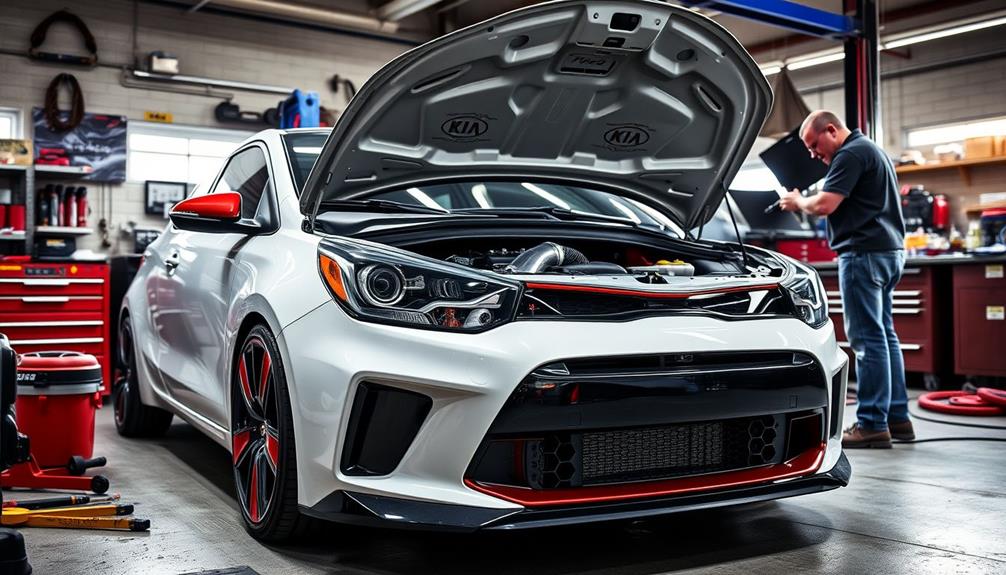
Upgrading the air intake system in your Kia Rio R Hatchback can considerably boost its performance and driving pleasure. By enhancing airflow to the engine, you'll notice improved horsepower and acceleration, with some systems providing gains of up to 10% in torque.
Plus, a performance air intake can enhance throttle response and improve fuel economy, making every drive more enjoyable.
Here are some key benefits of upgrading air intake systems:
- Increased Horsepower: Better airflow translates to increased horsepower.
- Improved Throttle Response: You'll feel a more immediate reaction when you press the accelerator.
- Enhanced Engine Sound: A well-designed system gives your engine a more aggressive tone.
- Easy Installation: Many aftermarket options feature plug-n-play setups, so you won't need extensive modifications.
Investing in a performance air intake system not only elevates the performance of your Kia but also enhances your overall driving experience.
With options available for your model at reasonable prices, it's a modification that pays off in both power and enjoyment on the road.
Voltage Performance Modules
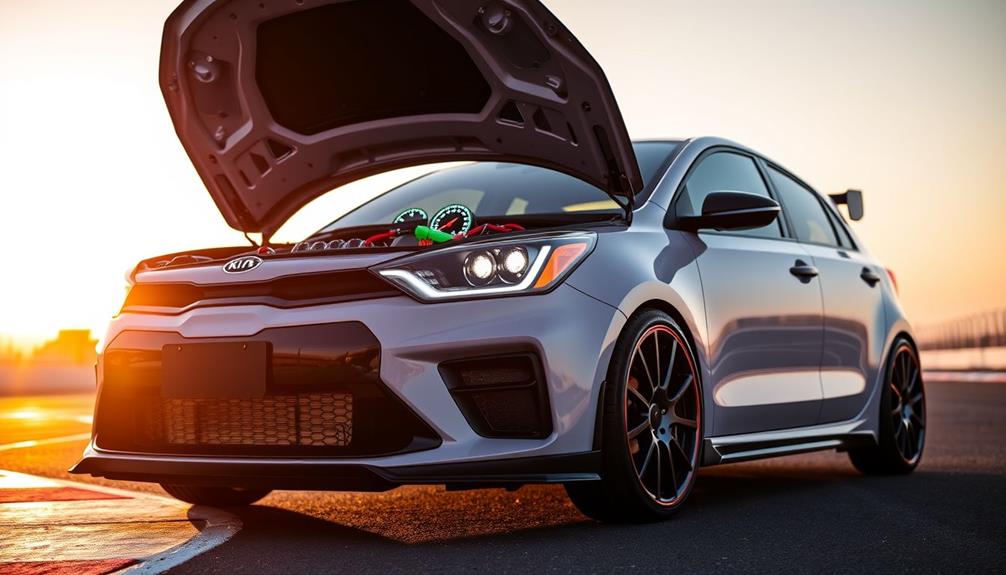
Voltage Performance Modules can greatly enhance your Kia Rio R Hatchback's engine performance by stabilizing voltage levels. By connecting directly to your battery, these modules guarantee that your engine gets a consistent power supply, contributing to a noticeable power increase.
The Mega Raizin Module, priced at $49.99, and the Raizin Voltage Stabilizer for $44.95, both utilize advanced electronic voltage regulation to improve your engine's responsiveness and efficiency.
Additionally, consider the Voltage Module LCD D1, available for $39.95. This module not only enhances audio quality but also helps improve fuel economy by stabilizing voltage levels.
Each of these voltage performance modules is designed to integrate seamlessly with other modifications and performance tunes, making them a versatile addition to your tuning setup.
Diagnostic Tools and Accessories
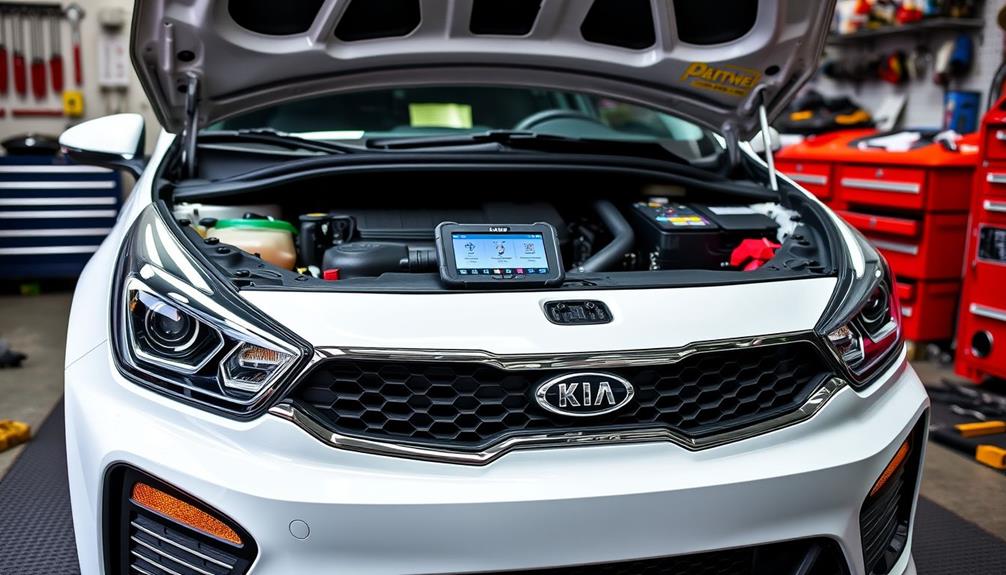
To maximize the performance of your Kia Rio R Hatchback, having the right diagnostic tools and accessories is key. Investing in quality tools not only simplifies troubleshooting but also enhances your tuning efforts.
Here are some essential items to evaluate:
- OBD2 Diagnostic Tools: A Universal OBD2 Code Reader (around $29.95) helps you read check engine lights and diagnostic codes, identifying performance issues quickly.
- OBD2 Splitter Extension Cable: For $18.95, this cable allows you to connect two diagnostic devices simultaneously, enhancing your ability to monitor and tune your vehicle's performance.
- OBD2 Extension Cable: Priced at $14.49, this cable facilitates the mounting of performance modules further away from the diagnostic port, offering flexibility in your setup.
- Performance Chips: These chips easily connect through a 16-pin socket and support both real-time diagnostics and performance tuning.
General Performance Enhancements
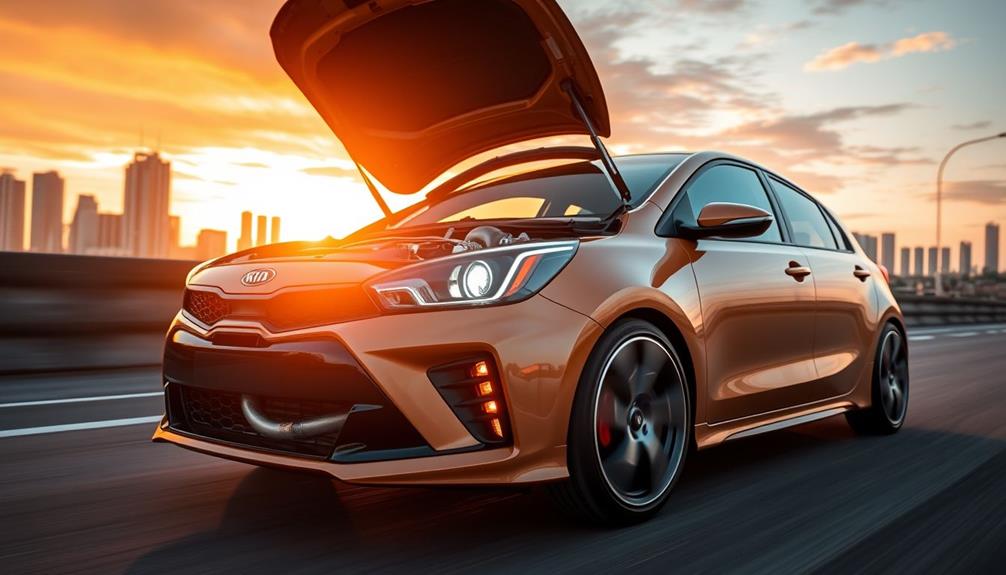
When you're looking to boost your Kia Rio R's performance, consider upgrading the air intake system for increased horsepower and acceleration.
A performance chip can also enhance your engine's power and throttle response, making your driving experience more thrilling.
These enhancements not only improve performance but can also lead to better fuel efficiency, making your ride more enjoyable and economical.
Performance Chip Benefits
With performance chips, you can release your Kia Rio R Hatchback's full potential, enhancing its overall performance considerably.
These chips optimize your vehicle's air-to-fuel ratio, leading to impressive gains in horsepower, torque, and fuel economy—up to 15%! You'll enjoy a more engaging driving experience with quicker engine response and improved throttle response.
Here are some key benefits of installing a performance chip:
- Boost in Power and Torque: Experience significant increases that make your rides more thrilling.
- Improved Fuel Economy: Potential savings of up to 4 miles per gallon can help you save at the pump.
- Simple Installation: Most chips offer a plug-and-play setup, ensuring you won't need extensive modifications.
- Affordable Options: Starting at just $99.99, you can unveil hidden engine potential with a money-back guarantee for peace of mind.
Whether you choose a Stage 1, Stage 3, or Stage 4 performance chip, you'll find options tailored to fit your needs, all designed to keep your engine's integrity intact.
Transform your Kia Rio R Hatchback today!
Air Intake Upgrades
Upgrading your Kia Rio R Hatchback's air intake system can greatly enhance its performance, often delivering gains in horsepower and torque of up to 10%.
By installing a performance air intake, you're optimizing the airflow to your engine, which is essential for maximizing its efficiency and output. Cold air intake kits, particularly those designed for the 2012-2015 Kia Rio with a 1.6L engine, can cost between $129.95 and $144.95 and considerably improve both airflow and filtration efficiency.
These air intake upgrades typically feature lightweight T304 aluminum piping, which not only boosts the engine sound but can also enhance throttle response and fuel economy.
The better airflow helps optimize the air-to-fuel ratio, leading to improved acceleration and overall driving experience.
Many performance air intake systems are designed for easy, plug-n-play installation, allowing you to upgrade your vehicle without needing extensive mechanical knowledge.
This means you can start enjoying the benefits of improved engine performance quickly and with minimal hassle.
Throttle Response Improvement
Throttle response is essential for an engaging driving experience in your Kia Rio R Hatchback. Improving this aspect can transform your daily drive into something much more exhilarating.
Here are some effective upgrades you can consider:
- Throttle controller: Devices like the Potent Booster enhance throttle sensitivity and reduce lag.
- Performance spark plugs: These generate a hotter, more concentrated spark, improving throttle response.
- Cold air intake system: This upgrade increases airflow to your engine, enhancing both throttle response and overall performance.
- Performance chips: Options like the Stage 1 Performance Chip optimize the air-to-fuel ratio, potentially boosting horsepower and torque by up to 15%.
Suspension and Brake Upgrades

Upgrading your Kia Rio R Hatchback's suspension and brake systems can transform your driving experience.
By enhancing handling and stability with performance shocks and larger brake components, you'll enjoy sharper cornering and improved stopping power.
These upgrades not only make your ride more enjoyable but also boost safety during spirited drives.
Suspension Upgrades Benefits
Suspension upgrades can greatly enhance your Kia Rio R Hatchback's performance, especially when it comes to handling and stability. By investing in a suspension upgrade, you can considerably improve your driving experience, making your compact car more responsive and enjoyable to drive.
Here are some key benefits of suspension upgrades:
- Better cornering: Enhanced handling allows for sharper turns and improved control during aggressive maneuvers.
- Reduced body roll: Upgraded components minimize lean in corners, providing a more planted feel.
- Lower center of gravity: Installing performance shocks and springs can lower your vehicle by 30-40mm, increasing responsiveness.
- Smoother ride: Improved suspension components effectively absorb road imperfections, enhancing passenger comfort.
With a quality coilover system, you can customize your Kia Rio's handling characteristics by adjusting ride height and damping settings to match your personal preferences.
Whether you're steering through city streets or hitting the open road, a suspension upgrade can transform how your car feels and performs.
Brake System Enhancements
When you're looking to boost your Kia Rio R Hatchback's performance, enhancing the brake system is just as vital as upgrading the suspension.
Start by installing performance brake pads, which markedly improve stopping power and minimize brake fade during aggressive driving. This upgrade alone can make a noticeable difference in your driving experience.
Next, consider larger diameter rotors. They enhance heat dissipation and provide a more responsive braking feel, essential for maintaining control during high-performance scenarios.
To further improve your setup, upgrade to stainless-steel braided brake lines. This reduces flex in the lines, leading to a more consistent brake pedal feel and better overall performance.
Don't forget about performance brake calipers. They increase the clamping force on the brake pads, resulting in better braking efficiency and shorter stopping distances.
Every enhancement you make to your brake system translates to improved safety and confidence on the road.
Handling and Stability Improvements
Enhancing your Kia Rio R Hatchback's handling and stability is vital for an exhilarating driving experience. By focusing on suspension and brake upgrades, you can greatly elevate performance and responsiveness on the road.
Here are some important modifications to keep in mind:
- Performance springs and dampers: Lowering the ride height by 30-40mm improves cornering stability and reduces body roll during turns.
- Strut tower brace: This upgrade enhances chassis rigidity, leading to precise steering response and better handling at high speeds.
- Lightweight alloy wheels: Not only do these improve aesthetics, but they also reduce unsprung weight, enhancing handling and responsiveness.
- Performance suspension alignment: Optimizing camber and toe adjustments maximizes tire contact with the road, resulting in superior grip and handling.
Don't forget about brake enhancements, as larger rotors and upgraded pads boost stopping power and reduce brake fade during spirited driving.
By implementing these upgrades, you'll notice a remarkable difference in your Kia Rio's handling and stability, making every drive more enjoyable.
Get ready to take your compact car to the next level!
Forced Induction Options
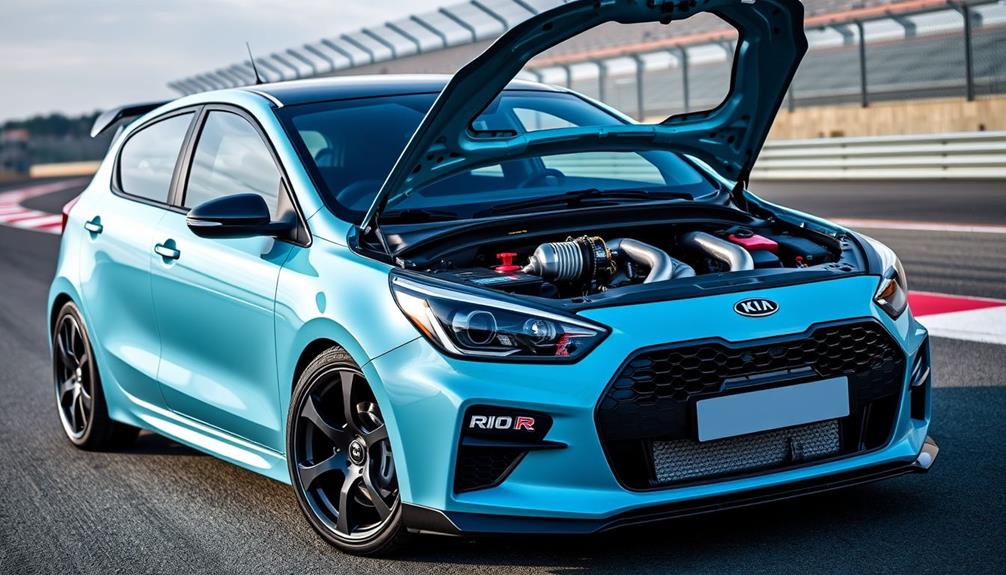
Typically, enthusiasts turn to forced induction options like turbochargers and superchargers to boost the performance of their Kia Rio R Hatchback.
These systems can greatly increase your car's power output, often adding 50-100 horsepower depending on factors like installation quality and specific components used.
If you choose a turbocharger, you'll enjoy the benefits of higher boost levels, typically around 5-6 pounds, which maximizes engine performance without requiring extensive internal modifications.
On the other hand, supercharging offers immediate throttle response, making it perfect for those who crave instant acceleration.
Both forced induction methods necessitate supporting modifications to enhance effectiveness and maintain engine safety.
You'll need upgraded fuel injectors, intercoolers, and an enhanced exhaust system to guarantee your setup operates smoothly.
After installing your forced induction option, professional tuning is essential.
It adjusts critical parameters like fuel maps and ignition timing, helping you achieve ideal efficiency and reliability while preventing potential engine damage.
Maintenance and Long-Term Care
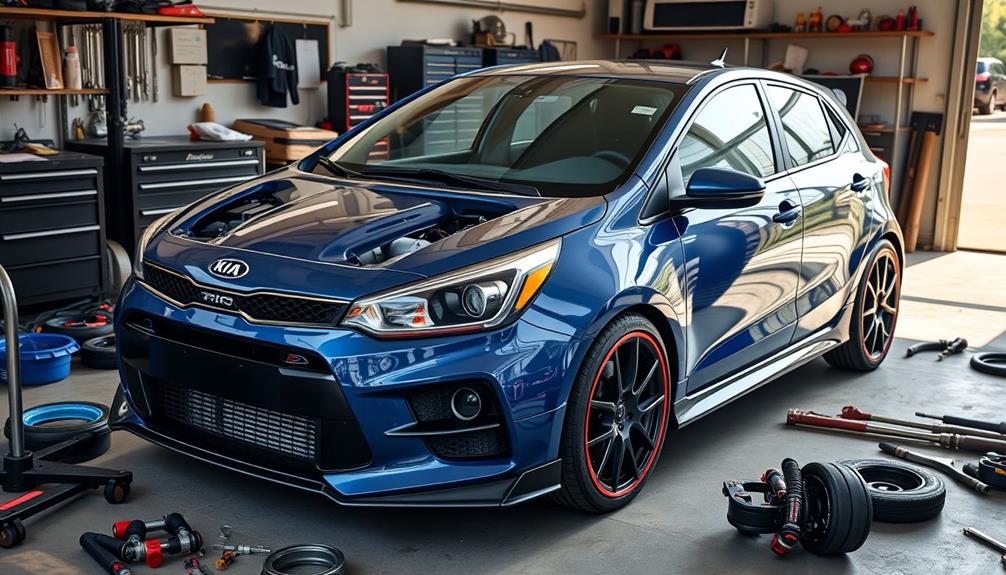
To keep your Kia Rio R Hatchback performing at its best, regular maintenance is key—especially after modifications that boost power. Neglecting this aspect can lead to diminished engine integrity and performance issues.
Here's what you should focus on:
- Regularly check the health of performance chips and make sure they're properly calibrated.
- Follow the manufacturer's guidelines for oil changes and fluid top-ups.
- Upgrade spark plugs and air filters, and conduct routine inspections to confirm peak function.
- Keep your ECU software updated to enhance the effectiveness of your modifications.
Additionally, don't overlook the performance air intake system. Regularly cleaning or replacing it prevents dirt buildup, which can restrict airflow and hurt engine responsiveness.
By prioritizing these maintenance tasks, you'll guarantee that your modified Kia Rio continues to deliver the exhilarating performance you crave without compromising engine integrity.
Frequently Asked Questions
Can You Modify a Kia Rio?
Yes, you can modify a Kia Rio. Upgrades like performance chips, cold air intakes, and turbochargers boost power. Plus, exhaust systems and ECU remapping enhance throttle response and overall driving experience, making it more enjoyable.
Does ECU Tuning Make Your Car Faster?
ECU tuning can transform your car into a speed demon, boosting horsepower and torque considerably. You'll feel the difference in acceleration, making your drive exhilarating while potentially saving on fuel. It's a thrilling upgrade!
Is the Kia Rio a Fast Car?
No, the Kia Rio isn't considered a fast car. It prioritizes fuel efficiency and moderate performance, with acceleration from 0 to 60 mph typically taking around 8 to 10 seconds, which is decent for daily driving.
How Does Tuning a Car Increase Horsepower?
Tuning transforms your automobile's attributes, tweaking the throttle and timing. It can boost horsepower by recalibrating engine parameters, enhancing airflow, and elevating efficiency—resulting in a spirited, speedy ride that satisfies your need for speed.
Conclusion
As you immerse yourself in tuning your Kia Rio R hatchback, each upgrade promises to reveal hidden potential. Imagine the thrill of enhanced performance as you accelerate down the road. But wait—what if you could go even further? With the right forced induction options and ongoing maintenance, your compact car could transform into a powerhouse. So, are you ready to take the leap and discover just how exhilarating your driving experience can be? The adventure awaits!
Ethan is at the forefront of hybrid vehicle technology, making him an invaluable resource for our readers interested in hybrid tuning. His expertise in electric motor upgrades, battery systems, and regenerative braking allows him to provide cutting-edge advice on optimizing hybrid vehicles for performance and efficiency. Ethan’s work ensures that our content stays ahead of the curve in the rapidly evolving world of hybrid technology.
Kia Tuning
Tuning Kia Sportage 2019: Unlocking the Full Potential of Your SUV
You can maximize your 2019 Kia Sportage’s performance and efficiency; discover the tuning secrets that will transform your driving experience.

Tuning your 2019 Kia Sportage lets you reveal its true potential, enhancing horsepower and torque considerably. With options like ECU remapping, you can boost your SUV's performance by up to 25 horsepower and improve throttle response without any hardware changes. Performance chips can further elevate your driving experience and even increase fuel efficiency by up to 4 mpg. Plus, the Sportage's advanced performance control system offers customizable driving modes to tailor your ride to your preferences. Explore these tuning possibilities to notice a remarkable transformation in your vehicle's performance and discover even more ways to optimize your SUV.
Key Takeaways
- Performance chips can boost your 2019 Kia Sportage's horsepower and torque by up to 30%, enhancing overall driving dynamics.
- Stage 1 ECU remapping optimizes engine parameters for gains up to 25 horsepower and 35 lb-ft of torque without hardware changes.
- Tuning improves throttle response and fuel efficiency, potentially saving up to 4 mpg or 1.5 liters/100 km.
- The advanced performance control system offers five customizable driving modes, allowing you to tailor your driving experience easily.
- Real-time feedback and automatic updates keep your performance tuning current, maximizing the functionality of your Kia Sportage.
Performance Comparison of Models
When you compare the performance of the 2019 Kia Sportage to the 2015 model, you'll notice a marked difference in driving experience. Many drivers find the 2015 version offers a more responsive feel and better acceleration, especially in low-end and midrange power.
Despite both models having similar specifications and gear ratios, the 2015 Sportage consistently outperforms the 2019 variant, even with higher mileage—some having over 110,000 miles.
User feedback highlights a significant gap in engine performance, with many expressing disappointment in the 2019 model. It often requires you to switch to sport mode just to achieve an acceptable driving experience.
This underwhelming performance has sparked community discussions about the necessity for performance improvements, as numerous owners feel that the factory settings don't meet their expectations.
If you're considering the 2019 Kia Sportage, it's important to be aware of these performance differences. Understanding the limitations of the newer model can help you make informed decisions about potential upgrades or tuning options to enhance its capabilities.
Tuning Options for Enhanced Performance
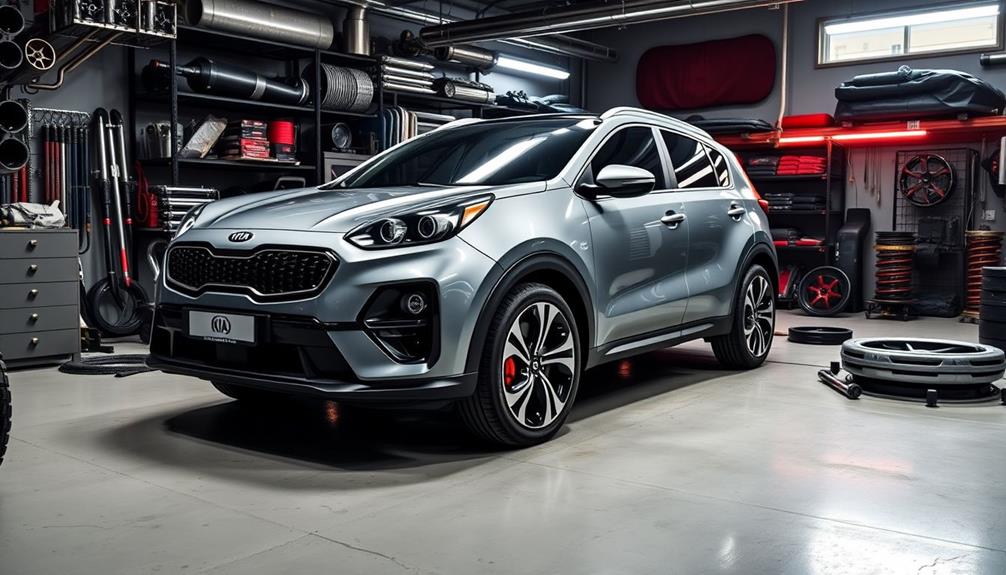
If you're looking to enhance the performance of your 2019 Kia Sportage, several tuning options can greatly elevate your driving experience. One of the most popular tuning solutions is a performance chip, which can release up to 30% more horsepower and torque. This significant boost directly improves acceleration and overall driving dynamics.
For a more straightforward approach, Stage 1 ECU remapping is an effective choice, as it optimizes engine control parameters without requiring any hardware modifications. These performance upgrades can also lead to improved throttle response and fuel efficiency, potentially saving you up to 1.5 liters per 100 kilometers.
With advanced tuning products like GAN chips, you not only get enhanced performance but also a 2-year engine warranty and a 50-day trial period, ensuring reliability after installation.
Additionally, many tuning options come with multiple driving modes—Efficiency, Sport, and Race—allowing you to customize your Sportage to suit your preferences and driving conditions.
Community Insights and Experiences

Many owners of the 2019 Kia Sportage have taken to online forums to share their insights and experiences with tuning options, revealing a common sentiment: the newer model often feels less responsive compared to its predecessors.
Many users express dissatisfaction with the Sportage's acceleration and driving dynamics, noting that the 2015 model offers better low-end and midrange power. This has led to vibrant discussions about tuning solutions that could enhance your Sportage's performance.
Community insights strongly highlight the effectiveness of chip tuning as a way to release additional horsepower and improve your driving experience. Enthusiasts often share their success stories, showcasing how specific tuning products have transformed their vehicles.
However, they also caution about the aftermarket tuning market. It's vital to choose reliable products to avoid scams and guarantee compatibility with your engine.
As you navigate these options, it's important to weigh the potential benefits against warranty implications and engine integrity.
Benefits of ECU Remapping
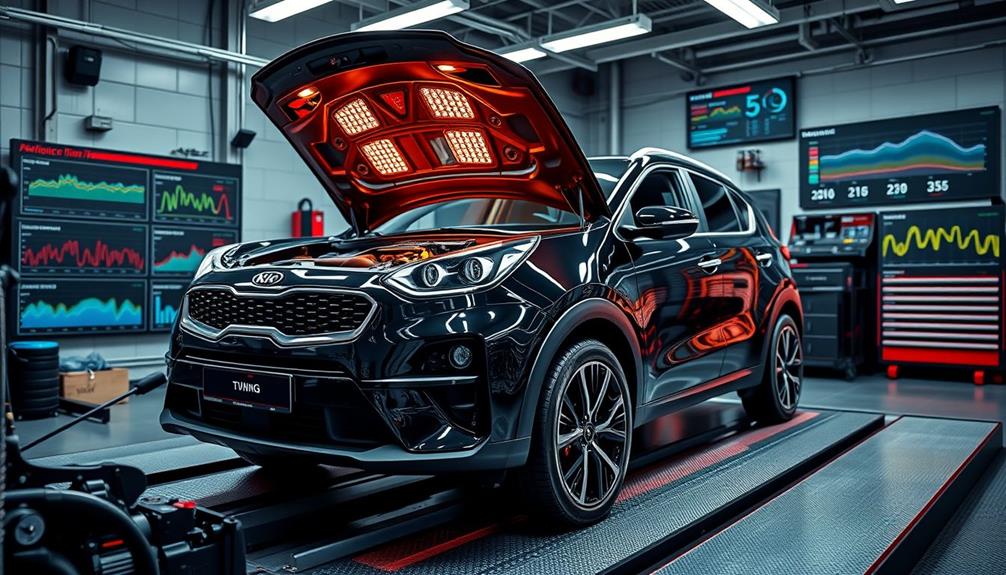
ECU remapping offers a fantastic opportunity to release your 2019 Kia Sportage's full potential. By optimizing engine control parameters, you can considerably increase horsepower and torque without needing any hardware changes. This process fine-tunes ignition timing, fuel delivery, and boost pressure, resulting in improved acceleration responsiveness and a smoother power delivery across the RPM range.
With Stage 1 ECU remapping, you could achieve gains of up to 25 horsepower and 35 lb-ft of torque. This enhancement doesn't just boost your SUV's performance; it transforms your overall driving experience. You'll notice a more engaging ride, with power that feels more accessible than ever before, especially in everyday driving situations.
Moreover, professional remapping services are designed to maintain your engine's integrity while maximizing potential. You'll enjoy a noticeable improvement in how your Sportage handles and performs.
While we won't explore fuel savings just yet, it's worth noting that many drivers report enhanced efficiency as a bonus of tuning. In short, ECU remapping is a smart investment for anyone looking to elevate their driving experience in the 2019 Kia Sportage.
Fuel Efficiency and Cost Savings
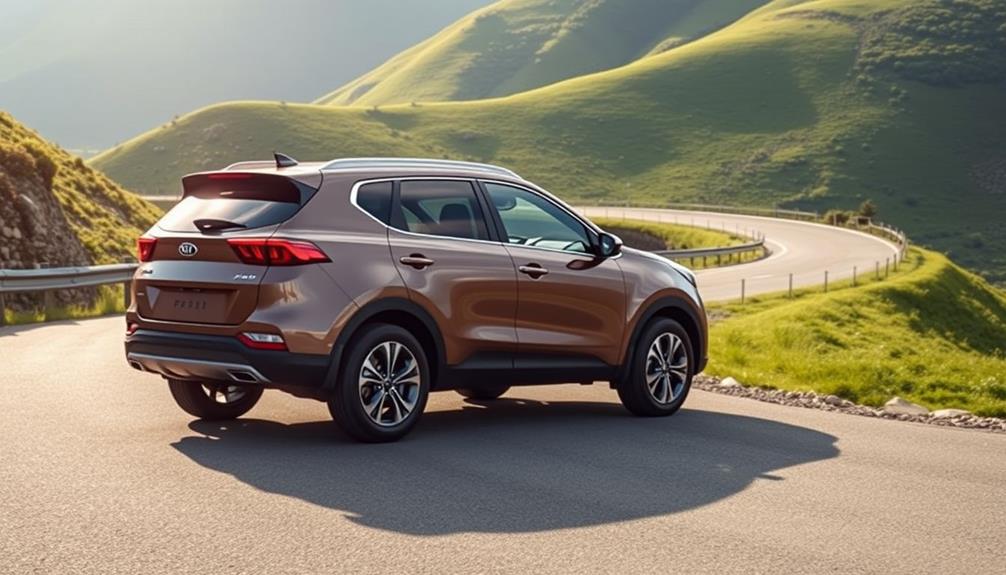
Tuning your 2019 Kia Sportage doesn't just enhance performance; it can also lead to significant fuel savings. By optimizing engine functions, performance chips can improve fuel efficiency, potentially saving you up to 4 mpg. With tuning, you might notice a reduction of up to 1.5 liters per 100 kilometers, translating into real cost savings over time.
One of the most effective methods for achieving these results is through ECU remapping. This process adjusts ignition timing and fuel delivery, providing both power gains and reduced fuel consumption. Many users have reported that after utilizing tuning products designed specifically for the Sportage, they experience not just enhanced performance but also noticeable improvements in fuel economy.
Additionally, integrating performance chips with cold air intakes can synergistically boost overall vehicle efficiency. This combination maximizes fuel savings while enhancing your SUV's performance.
Advanced Performance Control Features
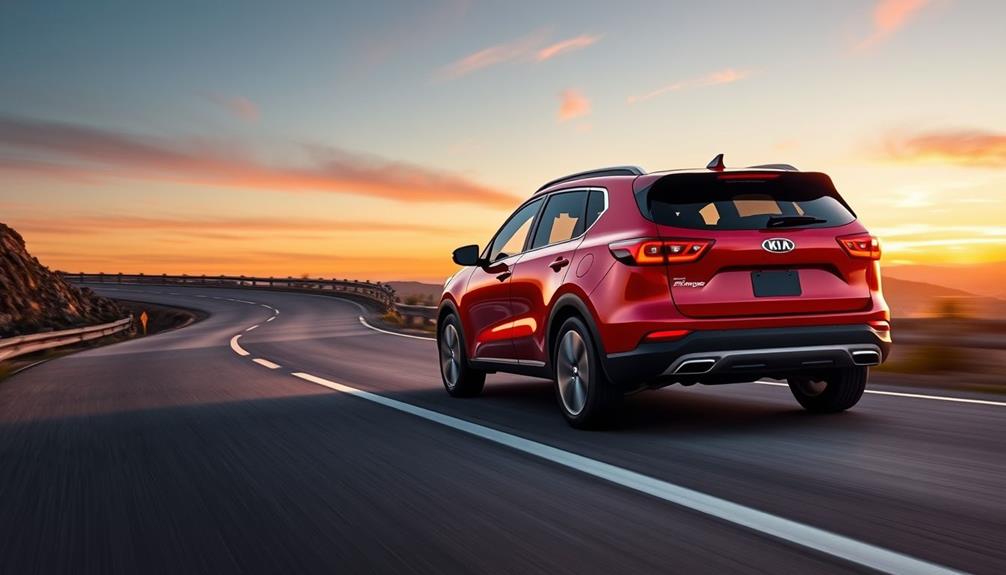
When you get behind the wheel of the 2019 Kia Sportage, you'll appreciate the advanced performance control features that let you choose from five distinct driving modes.
The user-friendly interface makes switching between modes a breeze, ensuring you're always in control of your ride.
Plus, with the ability to re-program up to five times, you can easily adapt the system to suit your driving style or needs.
Driving Modes Overview
With the advanced performance control system in the 2019 Kia Sportage, you can effortlessly tailor your driving experience to match your preferences and road conditions. This system offers five unique driving modes: Efficiency, Sport, Race, Comfort, and Eco. Each mode alters vehicle parameters to enhance performance and efficiency based on your needs.
Efficiency mode is perfect for urban driving, prioritizing fuel savings to help you get the most out of each tank.
Switch to Sport mode when you crave a more dynamic on-road experience, as it enhances mid-range flexibility, allowing for smoother acceleration.
If you're looking for maximum performance in demanding situations, Race mode lets you push the vehicle's limits beyond the ordinary.
The flexibility to easily switch between these driving modes means you can adjust your driving style on the fly.
Whether you're tuning your Sportage for a leisurely cruise or an exhilarating drive, each mode optimizes throttle response and engine performance.
User-Friendly Interface
The advanced performance control system in the 2019 Kia Sportage makes it easy for you to access and customize your driving preferences. With a user-friendly interface, you can effortlessly switch between five unique performance modes—Efficiency, Sport, and Race—tailoring your driving experience to match your mood or conditions.
This intuitive app allows you to optimize your vehicle's dynamics with just a few taps, guaranteeing maximum control on the road.
Moreover, the system enhances your experience by providing real-time insights into engine performance through the Smart Engine Health Check feature. You'll receive immediate feedback, helping you understand how your driving habits impact your vehicle's efficiency and power. This means you can make informed decisions on-the-fly, allowing for a more engaged and enjoyable driving experience.
Automatic updates keep the performance control system up-to-date, adapting to the latest advancements in tuning technology. This guarantees you're always equipped with cutting-edge features designed to enhance your Kia Sportage's performance.
With these tools at your fingertips, you're not just driving; you're commanding an SUV that meets your every need.
Re-Programming Capabilities
Many drivers appreciate the re-programming capabilities of the 2019 Kia Sportage's advanced performance control system. This feature allows you to tailor your driving experience to better suit your preferences and the conditions you're facing.
With its 5x re-programming capability, you can easily switch between tuning settings, optimizing engine performance across various platforms.
Here are some key benefits of the re-programming capabilities:
- Customizable Driving Modes: Choose from five unique modes to match your driving style.
- Enhanced Throttle Response: Fine-tune your vehicle's responsiveness for a more engaging drive.
- Optimized Fuel Delivery: Adjust fuel parameters to improve efficiency and performance.
- User-Friendly Interface: Easily navigate settings to make quick adjustments on the go.
- Engine Integrity Maintenance: Enjoy performance enhancements while ensuring the longevity of your engine.
With these capabilities, you can remap essential parameters like ignition timing, leading to improved acceleration.
Frequently Asked Questions
Can You Tune a Kia Sportage?
Yes, you can tune a Kia Sportage to enhance its performance. By using ECU remapping or performance chips, you'll increase horsepower and torque, improving throttle response and fuel efficiency without needing hardware changes.
What Is the Recall on the 2019 Kia Sportage Engine?
The 2019 Kia Sportage had a recall due to engine control unit issues that could cause stalling or fire risks. You should contact your dealership for inspections and repairs, often at no cost to you.
How to Unlock Kia Sportage Door?
When you're locked out, don't fret; the key fob's got your back. Press the release, or if the battery's dead, use the hidden key. Just remember, proximity opens magic—pull the handle, and you're in!
How Do You Adjust a Kia Sportage?
To adjust your Kia Sportage, you can tweak driving modes, utilize diagnostic tools for performance issues, and consider ECU remapping or installing performance chips for enhanced power and efficiency. Regularly check components like air intake systems too.
Conclusion
In the world of tuning your 2019 Kia Sportage, you're not just tweaking a machine; you're revealing a treasure chest of performance and efficiency. By exploring tuning options, remapping the ECU, and engaging with fellow enthusiasts, you can transform your SUV into a true powerhouse. Think of it as fine-tuning a musical instrument; with the right adjustments, your Sportage can hit all the right notes, delivering a symphony of power and savings that makes every drive unforgettable.
Ethan is at the forefront of hybrid vehicle technology, making him an invaluable resource for our readers interested in hybrid tuning. His expertise in electric motor upgrades, battery systems, and regenerative braking allows him to provide cutting-edge advice on optimizing hybrid vehicles for performance and efficiency. Ethan’s work ensures that our content stays ahead of the curve in the rapidly evolving world of hybrid technology.
-

 Tesla Tuning2 months ago
Tesla Tuning2 months agoTesla Cybertruck Sales: How Many Have Been Sold So Far?
-

 Tesla Tuning2 months ago
Tesla Tuning2 months agoTesla Battery Replacement Costs Revealed: How Much Will You Pay?
-

 Tesla Tuning2 months ago
Tesla Tuning2 months agoSupercharging Tesla: How Long Does It Really Take?
-

 Tesla Tuning1 month ago
Tesla Tuning1 month agoWhere Are Tesla Cars Made? Explore the Manufacturing Locations!
-

 Tesla Tuning2 months ago
Tesla Tuning2 months agoTesla CarPlay: Does Tesla Have Apple Integration?
-

 Tesla Tuning3 months ago
Tesla Tuning3 months agoTesla Mileage: How Many Miles Can You Drive on a Full Charge?
-

 Tesla Tuning2 months ago
Tesla Tuning2 months agoHow Much Does It Cost to Lease a Tesla? Get the Full Breakdown!
-

 Tesla Tuning3 months ago
Tesla Tuning3 months agoTesla Powerwall Cost Breakdown: How Much Will It Save You?



























